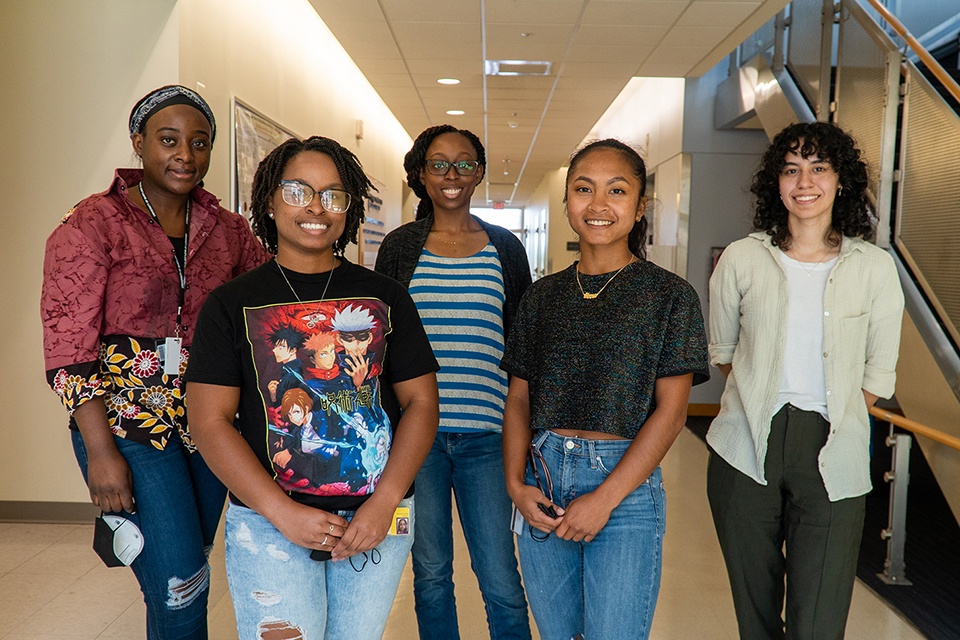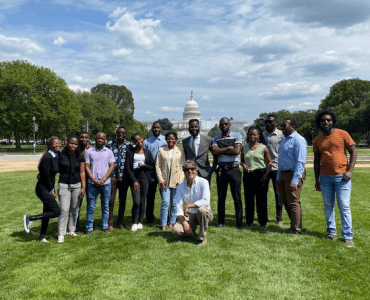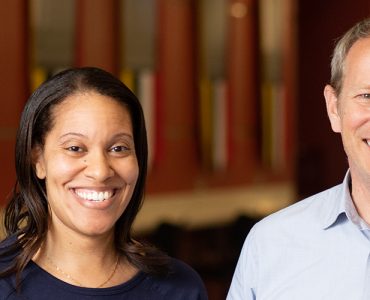
Minority employees continue to be underrepresented in science, technology, math, and engineering (STEM) fields, according to a recent Pew Research Group study. With a $1.1 million grant from the National Institutes of Health (NIH), the University of Maryland School of Pharmacy (UMSOP) and University of Maryland School of Medicine (UMSOM) are working to remedy that by teaming up to enhance diversity in the biomedical workforce with a new training program.
The five-year Initiative for Maximizing Student Development (IMSD) program strives to increase the number of students from underrepresented groups in the doctoral programs in UMSOP’s Department of Pharmaceutical Sciences (PSC) and UMSOM’s Graduate Program In Life Sciences (GPILS).
“I am exceedingly proud of this new initiative to enhance the numbers of diverse graduate students in the sciences at the schools of pharmacy and medicine and of what it means for the future of academia and research,” said Natalie D. Eddington, PhD, FAAPS, FCP, dean and professor at UMSOP. “As the second African American to earn a PhD in pharmaceutical sciences at the School of Pharmacy, I fully support initiatives like ours that seek to break down barriers, provide access and support, and create opportunities for all students to succeed on their chosen career path.”
The IMSD program’s goal is to train a diverse pool of PhD students across the biomedical research spectrum, which is why UMSOP and UMSOM are jointly hosting the program. Students will apply for admission to the graduate programs in PSC or GPILS. A team of faculty leaders from both schools will then select students for the IMSD training program, which will take 10 students per year — five in PSC and five in GPILS.
“This grant program affords us the opportunity to create a graduate school experience that is uniquely tailored to the needs of our students, in which they know that their opinions are respected, their cultural identities and connections are valued, and their intellectual curiosities are nourished,” said Mark T. Gladwin, MD, vice president for medical affairs, University of Maryland, Baltimore (UMB), and the John Z. and Akiko K. Bowers Distinguished Professor and dean at UMSOM. “Cultivating this type of inclusive academic environment is among our highest strategic priorities.”
‘We Need Each Other’
The students began in the program in August. Khady Ouattara, MS, who is a PhD student in the PSC program, says the IMSD program has fostered a sense of community.
“We need each other to grow at the top. It’s hard for us to get somewhere if we don’t have a voice at the top,” she said, adding that the program doesn’t always focus on science, which she appreciates. “We do retreats, we hang out, and we talk about different experiences in terms of race and the school and how we feel. We have monthly meetings, and we get a chance to really foster a sense of community with other minority scientists, and we get to see that there are other people like us doing similar things. This is the next generation.”
Kyla Roland, a PhD student in GPILS’ Molecular Microbiology and Immunology Program, applied for the IMSD program because she is passionate about increasing the proportion of underrepresented minorities in the sciences.
“I feel this program champions this ideal through its mission. It also provides a collegial environment for minority students at UMB to gather and support one another,” she said, adding that the program gives students “a monthly space to lean on and learn from each other.”
Mandy Oglesby, PhD, associate professor of PSC at UMSOP and one of four principal investigators (PI) of the grant, said she wants to help build a biomedical workforce that looks more like its community and the country.
“Diversity is incredibly important to the success of every industry,” Oglesby said. “When you have a diverse group of people working on a solution for a problem, you have more creativity and more representation in public health perceptions.”
Angela Wilks, PhD, the Isaac E. Emerson Chair of Pharmaceutical Sciences at UMSOP, is another of the grant’s PIs. “This award is not only an opportunity to increase the platform for underrepresented minorities on campus but is also a chance to expose all of our students to a diverse environment,” she said. “We want to prepare our students to work in environments where diversity, equity, and inclusion are hallmarks of whatever they do.”
Recruitment and Retention
Lisa Jones, PhD, a former faculty member at UMSOP who helped write the NIH proposal, said recruitment and retention are two major factors when it comes to diversification in biomedicine.
“Some students don’t think they can be scientists because of a lack of role models who look like them,” Jones said. “Our goal with the IMSD is to provide students with programming and mentoring to help them deal with issues that are unique to underrepresented populations.”
The IMSD grant aims to provide funding to address recruitment and retention gaps. It will cover first-year stipends for graduate students accepted into the program, conference travel, social events, and programming.
Other principal investigators for the NIH-funded program are Dudley K. Strickland, PhD, associate dean for graduate and postdoctoral studies and professor of surgery at UMSOM, and Tonya J. Webb, PhD, assistant director for diversity, equity, and inclusion and associate professor of microbiology and immunology at UMSOM.
“This grant program directly aligns with our mission of improving the human condition and serving our community, which highlights our strengths as a stellar research, educational institution, and a health care provider,” Webb said. “To me, to be a part of our students’ journey is amazing. It is a chance to be part of something great by helping create this protected space for the next generation of aspiring scientists to thrive, which is incredibly rewarding.”
UMSOP and UMSOM are working collaboratively to develop the program’s content, which will be catered to the IMSD students, including workshops on topics as wide ranging as scientific writing to dealing with microaggressions to the various career tracks in the STEM fields. The IMSD program emulates and derives from the University of Maryland, Baltimore County’s (UMBC) Meyerhoff Graduate Fellows Program, a multiyear IMSD partnership with UMBC. Other institutions implementing the NIH’s IMSD program include the University of North Carolina at Chapel Hill, Emory University, and the University of Arizona.



